
views
What kind of education do you need?

A bachelor’s degree in nursing. Most provincial and territorial nurses’ associations in Canada require potential nurses to have a bachelor’s degree in nursing. As the first step in your journey to becoming a nurse, check with your province or territory’s nurses’ association or regulatory body for a list of approved nursing schools and programs in your area. You can also download a current list of programs accredited by the Canadian Association of Schools of Nursing here: https://www.casn.ca/accreditation/accredited-canadian-nursing-education-programs/.
A Diploma of Collegial Studies program if you live in Quebec. Quebec does not require a university degree in nursing, but does require that you at least complete a 3-year Diploma of Collegial Studies (or DEC) program in nursing. If you would prefer a university degree, another option is to get a 3-year Bachelor of Science (BAC) degree in nursing.
How do you get your nursing license in Canada?
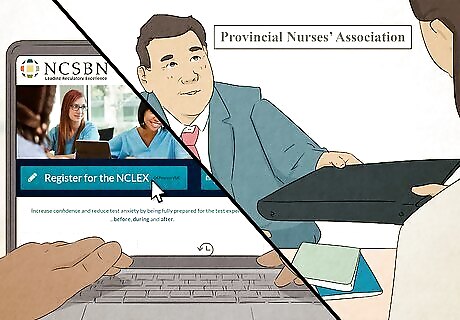
Apply to your provincial nurses’ association for assessment. Contact the regulatory body in your area to find out what steps you need to take to qualify for licensure in your region. Most of these bodies will require you to take 1 or more licensing exams to demonstrate your competencies in the field of nursing. For example, to begin the process of becoming a licensed nurse in Ontario, you must register with the College of Nurses of Ontario. In Quebec, all prospective nurses must apply to the Ordre des infirmières et infirmiers du Québec (OIIQ).
Take the National Council Licensure Exam (NCLEX). In order to become a Registered Nurse in Canada, you must pass the NCLEX. Each regulatory body or board of nursing in Canada has its own eligibility requirements for members wishing to take the NCLEX, so contact the appropriate organization in your area to find out what you need to do before applying to take the exam. Once you are ready to apply, they will provide you with the necessary application materials. After completing your application, register for the exam at http://www.pearsonvue.com/nclex/. You can also call 866-496-2539 to register by phone.
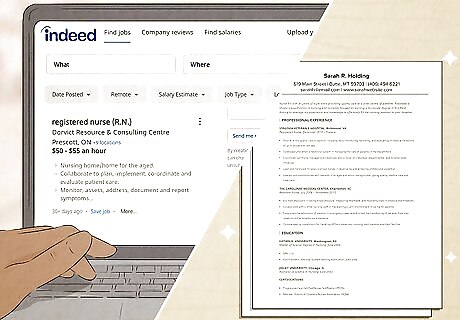
Meet the 4 basic requirements to be registered as a nurse in Canada. You must prove that you are fluent in written and spoken English or French, you have registration or the eligibility to register in the jurisdiction where you completed your nursing education program, you have Canadian Citizenship, Permanent Residency, or authorization to practice nursing under the Canadian Immigration and Refugee Protection Act, and that you have good character and suitability to practice. As part of the assessment of your character and suitability, you will probably need to submit to a criminal record check.
How do you find a job as a nurse in Canada?
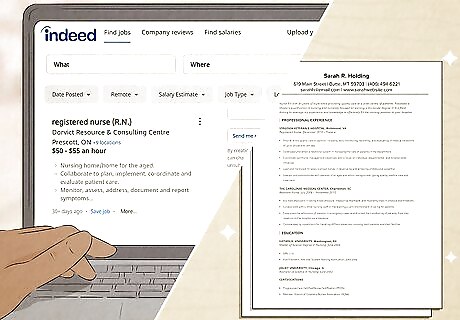
Craft a good resume. A strong resume is critical to getting a nursing job. A resume is typically 1-3 pages long, and consists of a summary of your career interests, education, and experience. A nursing resume should include a brief statement of your career objectives, a summary of your education, a list of any honors and awards you have received, a summary of your work and clinical experience, and a list of any professional memberships/affiliations you have.
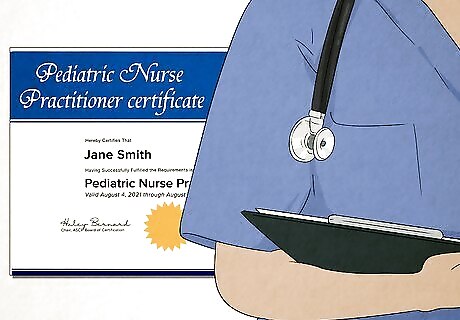
Search for nursing jobs in your area. You can find Canadian nursing job postings on a variety of general and specialist job boards. Look for jobs for nurses with your qualifications, who are registered to work in your territory or province. Nursing jobs in every territory or province in Canada are listed on the Canadian government’s Job Bank website, here: https://www.jobbank.gc.ca/home-eng.do?lang=eng. There are also region-specific job boards for nursing and other healthcare jobs, such as the Registered Nurses’ Association of Ontario’s RNCareers website: https://www.rncareers.ca/rncareers/index.htm
How can I improve my chances of getting a job as a nurse?
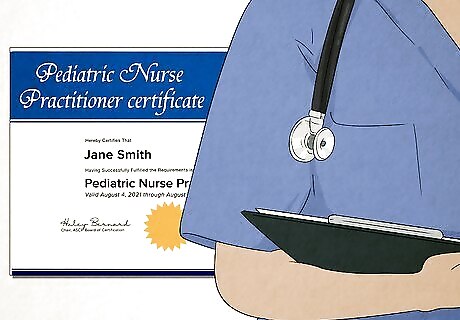
Get a specialty certification. Nurses in Canada can specialize in a variety of areas (e.g., Community Health, Critical Care, or Perianesthesia). Getting a certification after nursing school can make you more marketable and help you find jobs that match your interests. In order to qualify for a certification, you will need to have a certain amount of education and experience in your chosen area of specialization. You must also complete a certification exam.
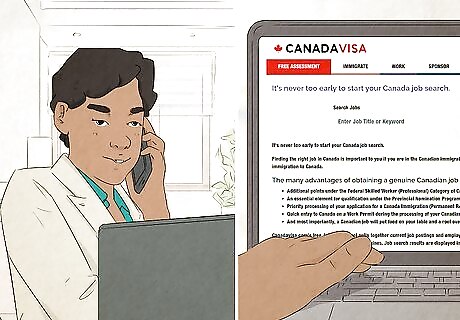
Expand your horizons by becoming a Nurse Practitioner. Once you become a practicing Registered Nurse, you have the option of eventually becoming a Nurse Practitioner. NPs can order and interpret diagnostic tests, communicate diagnoses to patients, prescribe medications, and perform certain medical procedures. The requirements for becoming an NP may vary depending on the rules of the regulatory body in your province or territory.
How do you immigrate to Canada to become a nurse?
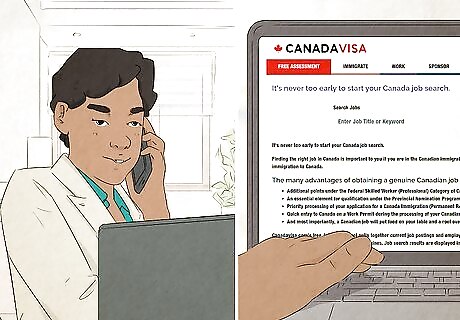
Get your credentials assessed before applying for work. To work as a nurse elsewhere in Canada, you must first follow a series of steps in order to qualify for a work permit. As part of your assessment, you will likely be required to take the National Council Licensure Exam (NCLEX). Contact the regulatory body in your preferred province or territory to find out how to qualify for the NCLEX. Visit this page to find information on how to contact the regulatory body/board of nursing in each province or territory: https://www.ncsbn.org/contact-bon.htm.
Register as a nurse in the area where you wish to work. After your credentials are assessed, you must register with either the Canadian Nurses Association (CAN) or the Canadian Council for Practical Nurse Regulators (CCPNR). The procedure for registration varies depending on the territory or province in which you are planning to work. This website has links to the pages listing registration requirements in each territory/province: https://www.cicnews.com/2013/08/coming-canada-nurse-process-082835.html#gs.AXmKbaU
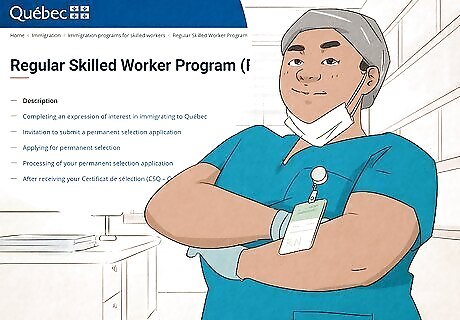
Apply for a nursing job and a work permit. Once you’re registered to work as a nurse in Canada, the next step is to secure a job offer. You can search for nursing jobs in Canada using job search tools like the one here: https://www.canadavisa.com/canada-job-search-tool.html. After receiving a job offer, you must obtain a work permit. You can apply for a work permit online or on paper. To start an online application or download forms for a mail-in application, visit the Canadian Immigration and Citizenship website here: http://www.cic.gc.ca/english/information/applications/work.asp?_ga=2.212897300.1629361107.1519254835-883044291.1519254835.
How do you immigrate to Quebec to become a nurse?
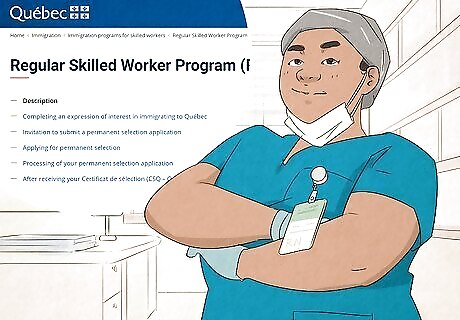
Choose the Quebec Skilled Worker program to get permanent residency. The QSW program allows qualified nurses to immigrate to Quebec as permanent residents without having to secure a job offer first. If you have enough points (at least 50 for a single applicant and at least 59 if you have a spouse/partner) based on the program’s list of selection factors, you may qualify for a Quebec Selection Certificate. The QSC makes you eligible for a Canadian Permanent Resident visa. Selection factors include: Your level of education Your area of specialization Whether you have a validated employment offer Your age (candidates aged 18-35 earn higher scores than older candidates) Your language proficiency in French or English Points are also awarded based on whether you have family in Quebec, whether you will be accompanied by a spouse/partner and/or children, and your level of financial self-sufficiency. For more information on how to apply, visit the official Quebec immigration website here: http://www.immigration-quebec.gouv.qc.ca/en/immigrate-settle/permanent-workers/index.html.


















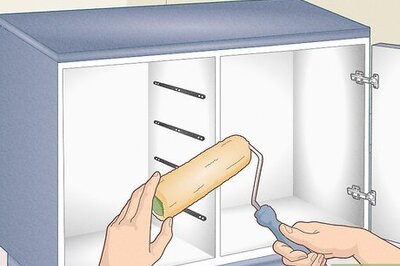

Comments
0 comment